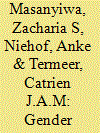| Srl | Item |
| 1 |
ID:
124398


|
|
|
|
|
| Publication |
2013.
|
| Summary/Abstract |
This article investigates the extent to which citation and publication patterns differ between men and women in the international relations (IR) literature. Using data from the Teaching, Research, and International Policy project on peer-reviewed publications between 1980 and 2006, we show that women are systematically cited less than men after controlling for a large number of variables including year of publication, venue of publication, substantive focus, theoretical perspective, methodology, tenure status, and institutional affiliation. These results are robust to a variety of modeling choices. We then turn to network analysis to investigate the extent to which the gender of an article's author affects that article's relative centrality in the network of citations between papers in our sample. Articles authored by women are systematically less central than articles authored by men, all else equal. This is likely because (1) women tend to cite themselves less than men, and (2) men (who make up a disproportionate share of IR scholars) tend to cite men more than women. This is the first study in political science to reveal significant gender differences in citation patterns and is especially meaningful because citation counts are increasingly used as a key measure of research's quality and impact.
|
|
|
|
|
|
|
|
|
|
|
|
|
|
|
|
| 2 |
ID:
131795


|
|
|
|
|
| Publication |
2014.
|
| Summary/Abstract |
Increasing participation in decision-making processes by service users is one of the objectives of decentralisation reforms in Tanzania. The argument is that decentralisation enhances participation by all sections of the community, and by women in particular, and results in decisions that better reflect local needs. This paper examines the impact of decentralisation reforms on service users' participation for delivery of water and health services in rural Tanzania, using a gender perspective and principal-agent theory. The paper investigates how decentralisation has fostered spaces for participation and how men and women use these spaces, and identifies factors that constrain or encourage women's participation. It shows that decentralisation reforms have created spaces for service users' participation at the local level. Participation in these spaces, however, differs between men and women, and is influenced by the socio-cultural norms within the household and community. Men have gained more leverage than women to exercise their agency as principals. Women's participation is contributing to addressing practical gender needs, but strategic gender needs have been less adequately addressed because gendered power relations have been largely untouched by the reforms.
|
|
|
|
|
|
|
|
|
|
|
|
|
|
|
|